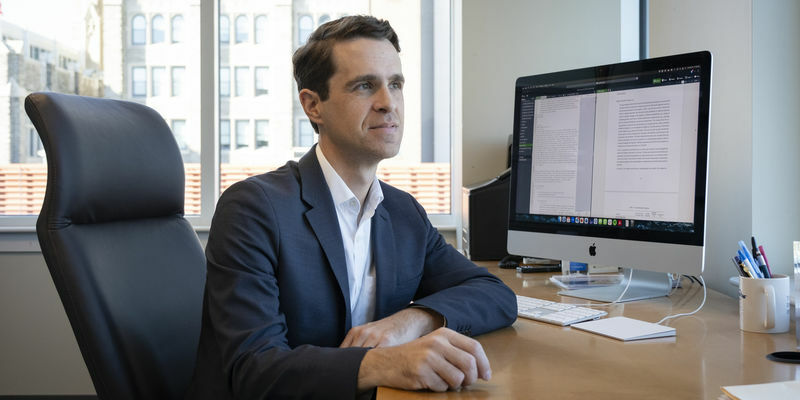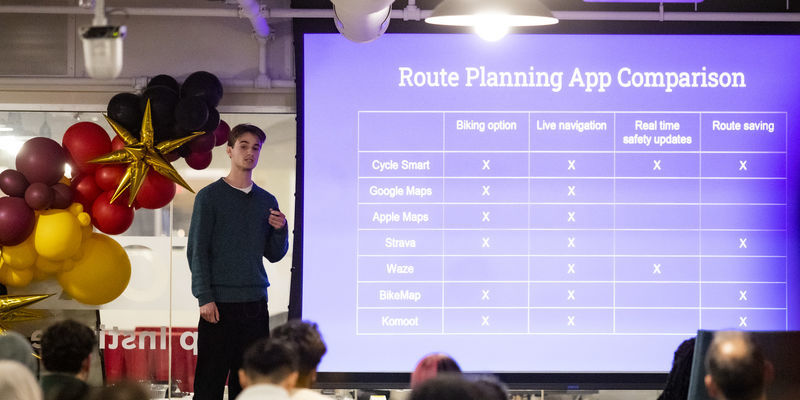Temple undergrads are launching research careers through an innovative Katz program
The Fels Biomedical Research URM Undergrad Program recently received $1 million to help expand opportunities for undergraduate researchers from underrepresented backgrounds.

“I wouldn’t be where I am today if not for the program,” is a common sentiment shared by the Temple students who participate in the Fels Biomedical Research URM Undergrad Program (FELS-BR-U2). From studying genes linked to cancer to examining the relationship between race and health outcomes, to unveiling basic cellular mechanisms, the program’s participants are conducting impactful, hands-on research.
The program was launched in 2020 by the Fels Institute for Personalized Medicine, which is part of the Lewis Katz School of Medicine. Its mission is to help Temple undergraduates from underrepresented minority (URM) backgrounds enter the science and medicine research pipeline. Whether they go on to graduate school or dive directly into industry jobs with companies like Merck, the program’s graduates leave with career-changing experience and confidence.
Xavier Graña, professor of cancer and cell biology at the Fels Institute and co-director of the FELS-BR-U2 program, recently received a five-year, $3.2 million R01 grant from the National Institute of General Medical Sciences, which includes $1 million to help expand the FELS-BR-U2 program to support up to 15 students annually. Over five years, the program is expected to support up to 35 students.
“This grant is important to me in two ways: It will help our lab to continue work based on our recent seminal contributions in our area of research on the Cell Division Cycle, and also fulfill a dream to fully establish a sustainable program to help break barriers and diversify the research workforce,” said Graña.
Graña developed the program alongside Kelly Whelan, assistant professor of cancer and cell biology at Fels, in response to the historical lack of diversity in science and medicine research positions.
“This goes back to 2020, a time of unrest and demonstrations because of the murder of George Floyd. That had an influence on us, and we began looking at what we could do to help,” Graña said. “Looking at our department, and the medical school as a whole, one thing that is pretty obvious, and has been for many years, is that there is a lack of diversity.”
Graña and Whelan set out to address that problem by supporting biomedical research opportunities for underrepresented racial and ethnic groups, defined by the National Science Foundation as African Americans, American Indians and Alaska Natives, Hispanics, Native Hawaiians, and other Pacific Islanders.
“Our program tries to not only put a more diverse pool of applicants into the pipeline, but to support them while they’re in the pipeline so that they can come out on the other side and be successful in biomedical sciences,” Whelan said.

Graña and Whelan began developing a program to address the lack of diversity in science and medicine research following the murder of George Floyd in 2020. (Photography courtesy of Ryan S. Brandenberg)
The FELS-BR-U2 program is a paid, year-round program in which students spend 12 hours per week working in a lab at the Fels Institute during the fall and spring semesters and full time during the summer. Graña and Whelan also organize professional development activities, such as conferences, presentations and guest speakers, designed to help participants build a network and prepare for their post-grad careers.
“The students are trained in a variety of techniques, and they also learn about the scientific method, how research is conducted and how research is presented,” said Graña, who added that several program participants have contributed to published research, which is a major milestone and resume builder.
“We currently have a paper in review based on work we did related to a gene called CTLA-4 and its workings within melanoma, a type of skin cancer,” said William Nazario-Lugo, Class of 2025, who joined the program in 2021 and has worked under Raza Zaidi, associate professor of cancer and cell biology. “If that gets accepted I’ll be a co-author on a published paper, which would be great for my CV, not just for medical school applications but also for my research career.”
Graña and Whelan knew it would be important to pay program participants, recognizing that the students are also taking a full class load and might otherwise need to work an additional job to support their college journey.
They also recognized the importance of exposing students to research and career opportunities they might not have even known existed.
“As we were building the program, we realized that a lot of these students didn’t know where the opportunities are,” Graña said. “They don’t know that you can make a good living as a scientist, either in academia or industry, so we provide information about where the possibilities are out there.”
When Brittany Yancey, CST ’21, started her biology degree, she assumed she’d primarily be working with liquids and chemicals in a wet lab. But after discovering different opportunities through the FELS-BR-U2 program she fell in love with the kind of data analytics work she does today.
“The program exposed me to a side of science and biology that I didn’t recognize,” said Yancey, who is now an associate clinical specialist for Merck. “I thought as a biologist I’d only find opportunities in a wet lab or as a scientific technician. I didn’t realize you can still be a scientist while sitting behind a computer and analyzing data to make decisions.”
Yancey entered the program in August of 2020 and joined Whelan’s lab, where she worked closely with a biostatistician gaining high-level Excel and data analysis skills. That experience helped her land an industry job right after graduation, even without any prior industry or internship experience.
Graduate school is another common landing spot for FELS-BR-U2 program students, like Aidan Douglas, CST ’23. While working in the lab of Jonathan Soboloff, professor of cancer and cellular biology, Douglas researched the anti-arthritic properties of a novel drug. The experience helped him recognize his passion for research and inspired him to change his post-graduation plans.
“Ever since high school I wanted to be a doctor, but once I got into the lab, I started to realize just how many people you can help by doing lab work,” Douglas said. “It’s infinitely more than the amount of people you can help being part of a practice, so I fell in love with that aspect of it.”
Douglas is now a PhD candidate in the biomedical sciences graduate program at Katz. Graña and Whelan are principal investigators in the program, and he credits their impact for helping him find his path.
“As someone who’s never had anybody in their family pursue their PhD I really appreciated how they laid out the foundation and showed us the different career paths we could take,” Douglas said.
The FELS-BR-U2 program accepts applicants year-round on a rolling basis. To be eligible for the program, students must come from an underrepresented racial or ethnic background, and they should be interested in a research-focused career. Interested students must also be majoring in one of the following degree programs: biology, biochemistry, genomics medicine, chemistry or neuroscience.
Visit the FELS-BR-U2 program’s website to learn more and apply.


